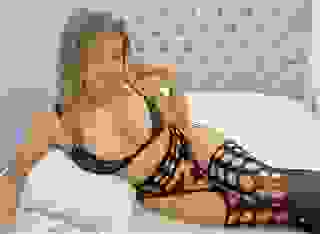Note: You can change font size, font face, and turn on dark mode by clicking the "A" icon tab in the Story Info Box.
You can temporarily switch back to a Classic Literotica® experience during our ongoing public Beta testing. Please consider leaving feedback on issues you experience or suggest improvements.
Click hereHe can see his death well before it happens. He had committed all his strength into the sword blow, as his arm and shoulder descend into the committed move and as he follows though, so does his head. I only have to guide the tip of my knocked arrow into place with the minimum of effort and he forces his head onto the point of the thirty inch arrow shaft held firm between finger and bow, the feathered end cushioned against my stomach. The arrowhead punctures through the top of his unhelmed skull for about six to eight inches. His body limp, he falls onto his back, the reddened iron arrow tip glistening in the glorious afternoon sun.
I have won a sword fight which lasted no more than a second and we never even touched blades.
Before their leader even hits the ground, head, the resistance of the traitors is ended.
Alwen is in my arms before I can stop her.
"Alwen, the plague, I have left off my face mask!"
"My Lord, Sir William Archer," she scolds, "husband and father. For what we have been through today you can forget your theories on pestilence and rely on proper faith in your God and your King. Now kiss me before your new son or daughter hits this dusty road."
My lovely Alwen doesn't birth our child tonight, but later, sharing our tiny but comfortable and familiar bedroom at the inn later that night, I swear I can still hear the King's mirth at his umpteenth retelling the tale of the briefest of sword actions reverberating in my ears!
33.
Life anew
(Lady Alwen Archer of Oaklea, heavily pregnant wife of Sir William Archer, narrates)
The Count was talking gently, calmly to me but I have eyes only for my husband, standing with bow fully charged with one of his war-point arrows, seeking out a shot at the Count behind me. He repeats himself and some of it sinks in.
"... not as you perceive, Madam, ... King ... shoot ... now."
"What?"
"Lady Alwen, things are not as you perceive, Madam, I support my cousin the King, and the King is now before you. I don't want your husband to shoot me now."
I hear the King, not what he says, my thoughts still taking in what I hear, but it is the King, his voice and presence unmistakable.
Then Will is fighting for his life with Wellock, but within half an intake of breath, the traitor falls dead at his feet and the revolt is over.
The Count squeezes my shoulder and hisses "Go to him, he needs you now."
And I need no further encouragement.
It is later, in the Hall that it hits me. Still I tremble at the thought of death and what could have happened. I blow out the face mask that Will insists I wear. I had kissed him and he tells me he could be a carrier. He is concerned, and I happily do as he asks, it is a small thing, but I trust in God, and today God will allow my William to have his way. It is not uncomfortable and I do not want to eat. If I drink, it is but well water only to quench my thirst.
The feast in the Hall to celebrate the victory is sombre, compared to most. It is strange seeing a King at the head table with two wives, one on either side. But they have known each other every since the King took Adela for his Queen, and they get on well together, these women of 46 and 26.
I have spoken to Queen Adela before, she is a pretty, sweet childlike girl, and devoted to the King, accompanying him everywhere and happy with the semi nomad life of a monarch's wife.
The King's other wife, Lady Elspeth, Marquess of Stewkley, an inn keeper like me, is an interesting woman. Her dark red hair is greying now but she is alive with the excitement of her ride with the Black Knights. She recounted earlier, when we woman retired to the Inn's quiet parlour, the recollection of her hours before the traitor Wellock came calling too late to snatch her, she had already been claimed by her King and husband with his select band of Black Knights.
I decide to retire early, tired from the excitement, lack of sleep last night and the sweet burden of impending motherhood.
When word spreads around the hall that I am retiring, the guests all have to call by my fireside seat in the parlour to give me their best wishes. Many are riding out at first light, to mop up those named as conspirators or supporters, before raising an army to avenge Chester by taking the fight to the Welch.
The Count comes first, still moving with difficulty. Earlier, at the feast when the ladies were still present, the Countess, Lady Elinor, insisted on telling us all how she and her husband Gervais were expecting Robin and his friends to come to her rescue, but the boys seemed reluctant to intervene until the Count removed his chain mail trousers to simulate a maiden's violation.
"Madam, I am sorry to hear you are indisposed," the Count says with complete charm, "I am sorry to have put you through such discomfort but at first I had to impress Wellock's men and then taunt your husband over his loyalties. I had no idea the executioner was going to kill your poor Steward before we had even started talking. King Henry wanted to hear Sir William's words of loyalty himself before revealing his presence."
"Stephen's death is regrettable," I say, "but I have been heartened that His Majesty has promised to compensate his parents and bride to be for their loss. How are you? Are your arse cheeks still sore?"
"Oui, they are. But it was a remarkable clean shot and healing well. I hope you sleep well, ma'am, the Kingdom is now safer with these traitors known or captured."
I thank him for his wishes and, although I had no wish to upset him, I do blame him for his deceit. If he hadn't been so convincing in his act, would the late executioner have been so bold in his actions?
Earlier, as they could see me losing interest in the evening, both wives of Henry, Lady Elsbeth and Queen Adela, each good friends with the other, as Elsbeth once was with the late Queen Matilda of Scotland, came to wish me well and advise that I retire.
Henry visited Elsbeth and his daughter many times while the Lady Elinor was growing up and even taught the little girl sword fighting with wooden swords. But, Lady Elsbeth tells me, Lady Elinor had always enjoyed horse riding and archery and developed into a superb horsewoman, able to hit any target while mounted.
Although Lady Elsbeth owns the Inn at Pitstone, she has long been the Marquess de Stewkley, with a good manor house there. And, like her daughter, she used to be one of Henry's spies in her younger days, often working as an inn maid, eavesdropping on plots.
The King insists on escorting William and I to our bedchamber. He explained, or tried to explain to us his recent actions.
"There is always intrigue in court, Will, the place usually reeks of the stench of all manner of deals and secrets kept or shared. I have long suspected a plot fermenting since before Prince William was drowned, and we narrowed its origin down to the area somewhere from the Welsh Marches to Bartonshire.
"The Earl of Chester led my investigations and he suspected Wellock's involvement, but couldn't be sure of anyone else involved other than the late Sir Giles then Shire Reeve. Losing the Earl of Chester last year was almost as much a blow as losing my beloved son, because of Chester's control over this area of my Kingdom. I thought Sir Giles was in on the plot, but you killed him before I could torture it out of him."
William does not say anything, so deep he is in his thoughs. I jump in when King Henry gets to the end of his sentence.
"My husband did not kill Sir Giles, he may have been pushed by Will but he fell upon the dagger of one of his soldiers."
"I know, my Lady," he says softly, in contrast to his otherwise huge voice, "but I like to tease William whenever the subject is raised, although with his efficient running of this county, that Sir Giles rarely gets any mention nowadays."
Will rolls his eyes, a slight smile on his tight face, still red from trying to rub off the red stain that stubbornly refuses to surrender to soap and water.
"My spies," King Henry continues, "have told me since your appointment that you met with Wellock frequently, but no intimate detail of your conversations had been obtained by them—"
"But—" I protest for Will.
"I know, I know, Lady Alwen, And Sir William, I hear your protests, without you even voicing them, they are written on your face. I am aware that you have to deal more often with the difficult barons, and he was being particularly obdurate over his bridge rebuild. Rebecca vouched for you, she always has, and I should have listened to her. She's my banker too and a principal ever-reliable informant."
Will speaks up at last. "I am glad you came to the right conclusion, your Majesty. I have no complaints on my part, suspicion, jealousy and ever-watchfulness are all part of the life above my earlier station in life. But Alwen, she has suffered great loss and shock, at a time when such surprises can be disastrous."
"I am so sorry," he asks, "is there is anything we can do for either of you?"
"Your Majesty," I say, "we are all tired. I thank you for your Knights and for the help of your Friars with our son Robin."
"Well, your Robin is a fine boy, a credit to you both. Anyway, don't thank me for The Augustinian Brothers, that order, and the secret society within were formed by my late wife, Queen Matilda. I think she assumed they would prove useful to me and also help minimise the attacks on Monastery trading routes. I know that Rebecca uses them ... shall we say, religiously!"
He laughs as heartily as he ever does to his own jokes, and gives me a firm squeeze and an even firmer one for William, before turning and carrying on his laugh as he returns to the hall for more of our Inn's ale, which he prefers even to wine.
"I wish you well when you leave in the morning, Sire," I call out to his departing back, which he acknowledges by a wave as he turns the corner.
34.
Settled
(Robin of Oaklea narrates)
Quietly I sit away from the men at arms and the Friars, the victors who are cheerfully drinking their fill. All the ale in the Inn's barrels has already gone, so they have started on the wine. No more ale until the day after tomorrow, when the oldest batch that was started in the brew house should be cleared and barrelled and ready to drink, Alwen says.
The King is going to war against the Welsh Prince of Powys in the morning, though, and he is drinking wine as if he will go on all night long. Only Father Andrew remains with him goblet for goblet, and even he is starting to nod his head in weariness. I am not sure he realises that tomorrow is Sunday ... I believe it is, at least.
The Queen and Lady Elsbeth retired to their separate chambers long ago. My mother and father went to bed even earlier than they did. Alwen looked particularly drawn from her experience. The loss of Henry Small and Stephen Gloucester, a couple of innocents, as well as one of the archers that my father had brought from town, an ale house keeper, who was well known to my mother as a customer. All were innocents in this plot. I feel the loss of Henry particularly, I considered him reliable if dull company and a genuine protective friend to us all.
Hugh, I see nowhere, since Alwen permitted the jugs of wine to descend to the lower tables; I suspect Hugh is under one of them, asleep. Looking around the hall I wonder why we provide rooms with beds at all, when most guests seem to sleep where they drop in the drinking hall.
Someone sits down next to me, but I have no need to look to see who it is. Her hair colour and its fully brushed excessiveness gives her away without a second glance.
"Sorry to have deceived you, Robin, over this past week, with a series of calculated lies, but my father needed to know who the real ringleader and the financial backer of this treasonous plot was."
"So, we have all been used," I say, with undisguised bitterness, "you used me and your father used you."
"Yes, they did. But, it all worked out in the end."
"Did it? I am not so sure, I am still confused at what constitutes the end, and what the whole point of it all was anyway."
"What are you confused about, what don't you know?"
I am not sure if I really want her to continue, I just want the whole sorry mess to go away. My silence is a form of answer that she responds to.
"Look, Gervaise and I thought that your father would jump at the chance to save a maid's honour in that wood. His reputation goes before him. Hey, even bards write and play songs glorifying your parents and their love story at court."
"Really?"
"Really."
"I wouldn't tell them that you know, they even think most of the Oaklea villagers don't really know their story."
"Ha! Ha! That's rich. They are a lovely couple though. Anyway, that is why we put on that acting outside the inn at Wellock Brigga. We waited up the lane for either you or your father to come outside. As a bonus, your father followed you out just as we arrived in front of you. Gervaise pulled me right into your face and I gave you a long lingering look to ensure you would recognise me later."
"Oh, I recognised you all right."
"We knew you were coming through the wood just behind us, as one of the men had shinned up a tree, and told us roughly where you were. The canopy was too thick to see you clearly. So I let out a few screams for your benefit but then nothing. We couldn't see you but knew you were there somewhere. We thought your father was still with you. I now know that because your father wasn't with you, you hung back. We were sure that he wouldn't have done. One of the coachman, pretending to laugh at us, managed to catch a movement from Hugh and told us you were simply standing and watching. So I asked Gervaise to make our struggling look rather more convincing..."
"And that's when I shot him."
"Yes," she giggles, "he won't forget that in a hurry. So Gervaise and the men ran off, and there I was, left behind with just the three of you. But no Will Archer, who was the one person I was after."
"And that's when you kept asking me about him and I wouldn't tell you anything."
"That's right, it threw me completely. I couldn't get a message to anyone because we hadn't foreseen this. I had to wait until we got on Ecgberct's ship and I tried to hand signal through gestures for Gervaise not to follow us to Brugge but to go back to Wellock and see if my abduction by Will's family would draw him out and it did. We thought that your father would refuse to help me because he had to be here for the rising, you know, bringing his men to the party with Wellock and his cronies. So I made the most of spinning you the story about the dowry being everything we had and we continued to Brugge. In the original plan, the idea was to lure your father Will to Brugge and get him and the Shire tax horde out of the game, and give him the opportunity to prove he was untrustworthy by trying to steal my dowry, which Rebecca never would have allowed anyway."
"So Rebecca was in on this ... web of deception?" I ask.
"Yes, but to be fair to her, she was always confident of Will's loyalty. She was surprised to see you, when we arrived in Brugge, but a glance from me warned her to play it by ear. Gervaise had sent a pigeon message to Rebecca, but not until he returned to the pigeons we had left at Wellock, and the bird was presumably lost or delayed in the storm."
"But wasn't Wellock involved in the treason from the beginning?"
"Aye, he was, but we knew that he did not have the wealth needed to back such a venture. He needed ready coin to pay for an army and persuade others to join the cause, and he had none. But the Shire Reeve, Sir Giles collects all the taxes in the spring, and that is a lot of loose change, but your father Will was the new Shire Reeve in town, so the plot was abandoned last year. Then the rumours started again in February of the plot's revival. And the Privy Council had mixed views on Wellock's loyalty. That is when we spies came into play. Gervaise came with a letter of introduction from the Count of Flanders, who knows Lord Gerald of Wellock slightly, and used him to broker the 'marriage' between him and I, through my mother. Gervaise tempted him with the dowry money, saying he would pay him handsomely for his troubles, once he got the dowry. But when Gervaise returned to Wellock to tell him that I had been abducted and beaten them to Flanders, he couldn't say he knew who the person was who shot him, so he only described you to Wellock."
"And Wellock tied that in with Henry's message the previous day?"
"Aye, Robin, that's right. And John Wakeford was there on hand to advise Wellock who you were, and exactly where you lived."
"Of course, Wellock had never been invited here, he would have assumed that Will Archer and his family lived in the Castle Keep at Bartown."
"The fact that Wellock had seized the opportunity to get back at your father with something even as insignificant as not passing on a message to Sir William, was a factor in Gervaise believing Will was innocent, but King Henry needed more convincing, believing Will's quick rise to power may have gone to his head."
"And now proved beyond doubt to be untrue."
"Beyond all doubt, your father is even higher in the King's estimation than before he became suspicious. My father is also much taken with you, Robin, it was your arrow that killed Wakefield as he was about to fire at the King's head. You have saved the King's life. It is only your age that prevents him from knighting you here and now and granting you a county of your own!"
"My arrow was only an instant before my father and your darts hit, and my father's came from furthest away and may well have been released first."
"We'll never know, Robin."
"So who was it that turned out to be the financial backer of this plot?"
"Wellock's clerk had in his baggage train letters of credit from King Louis of France, and also from a bishop close to the King, one whose name I am not allowed to say, but he will be dealt with quickly and quietly. Wellock went to get my mother Lady Elsbeth as a bargaining tool for the dowry, but Rebecca got a message to the King to ensure that he got there first, with his Black Knights, a secret chivalric order he formed from highly trusted knights. Wellock was going to take her to Oaklea and seize Lady Alwen too, knowing that you or your father would return there as soon as possible, John Wakefield was crucial here, otherwise Wellock wouldn't known where to reach your mother other than the impossible Castle Keep."
"So what now, my Lady," I snap, "do you still need to arrange an annulment, or was the marriage at Wellock a sham, like everything else, too?"
"You sound so bitter, Robin. What's wrong?" she asks, "I thought we had become friends, really good friends in fact."
How can I tell her how I feel about this whole episode? How can I tell her that she occupies my every thought. Me, an archer from a village she'd never heard of, the adopted son of his natural father, a commoner, who until a week ago hadn't travelled further than my county town. Meanwhile, this girl has been a Royal spy for years, travelling around the world, with estates in Breton and Buckinghamshire, and is the acknowledged and legal daughter of a King, although she can never be a princess. And I am only an archer's apprentice.
And I've seen her sitting all friendly next to De La Warre, her co-conspirator on the top table. He is a fellow spy and all round exciting character, still with his estates in Flanders, as the story of switching sides and losing his estates to Burgundy was clearly another ruse to get him close to Wellock.
The talk at the table was that the Count of Flanders inadvertently let it slip that Lady Elinor was of Royal blood and Wellock saw a way to get his hands on the dowry and perhaps sire an heir to the throne; then King William III, conveniently meets with an accident and Wellock would be Regent until Elinor's child came of age. That was that theory the King and De La Warre openly argue about in various forms until this one is concluded with. It is clear that De La Warre is highly regarded by King Henry, as they exchange the various methods by which Wellock would have bumped De La Warre off. It was an amusing exchange of outrageous suggestions that I would have found funny in any other circumstance. Lady Elinor chirped in with a couple of funny death scenes in all their gory detail, that made her laugh so much that the bar maid came out in her and she had to wipe the tears and blow her nose on the bliaut she wore that Queen Adela found for her in her baggage train.








